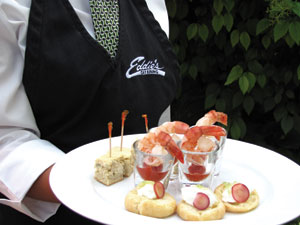Even a thriving business can be reborn, transformed and achieve even greater success after its recreation.
Case Study: Eddie’s Catering, Omaha, Neb.

The roots of Eddie's Catering go back 60 years, when Eddie Galas opened a small bar and grill in Omaha, Neb. In 1964, after expanding, Eddie's Restaurant and Lounge added a catering business.
In 1987, Eddie's Restaurant and Lounge burned to the ground, but out of its ashes Eddie's Catering was born. "My parents, two brothers and I voted on whether to rebuild the restaurant or start a catering business," Kris Galas says. "I lost in a four to one vote."
Ironically, Galas ended up buying out his family members' share of the business one by one between 1988 and 1998. He now runs Eddie's Catering with his wife Cheryl. "Although the first couple of years were touch and go, the new business became even more lucrative than the restaurant had been," Galas says. "I'm glad I lost that vote."
When the on-site catering operation began, it included a larger kitchen, smaller dining room and an established clientele. Over the years, the clientele has expanded, as has the operation as a whole. Galas added a second location in 1998, purchasing an existing social hall that seats 450. This almost quadrupled the initial site's seating capacity of 120.
Still, more than half of the catered events are off-premise and include weddings, anniversary parties, funeral luncheons, showers, graduations and baptisms.
The company's motto is, "No party too large and no detail too small." Galas' smallest event was a lobster dinner for two and the largest was a gymnastics competition, where he fed 16,000 people over the course of three days.
Eddie's Catering employs 10 full-time, 30 part-time and, as Galas describes them, 20 casual employees. "Our casual employees are people with full-time jobs that have worked here before," Galas says. "They help us out when we get real busy. None of our employees get to quit."
As business increased, so did the size of the operation's main kitchen, which is now approximately 2,000 sq. ft. The kitchen's center includes vented ovens and fryers, refrigeration on one wall, dry storage on another wall, and utensils and pans on the third wall. The major equipment includes two ovens, five combi ovens, three fryers and a tilt skillet. Outdoor grills provide cooking capability in the main site's parking lot and at off-premise events. Turkey fryers and outdoor propane grills are utilized for finishing off food in locations with no cooking facilities.
Food is stored in walk-in refrigerators and freezers, in addition to three reach-in freezers and two reach-in refrigerators.
During busier periods, a 500-sq.-ft. kitchen at the secondary social hall location is utilized. Most food is prepared in the main kitchen and transported in thermal hotel pan carriers to off-site events.
"We don't take much equipment with us to heat food," Galas says. "The biggest challenge with catering off site is not overcooking the food. Proteins that are held too long get tough and chewy, while items like pasta, potatoes and vegetables will get mushy. If you have to keep something hot for two to three hours, you also have to allow time for the item to cool [before serving]."
More challenging items like pasta are precooked, transported cold and rethermed on location using strainer pans and boiling water. Galas' stock for transporting food includes 40 multiple pan carriers, 30 single pan carriers and 25 five-gallon drink containers.
For off-site events, Eddie's Catering utilizes rental companies for tableware, seating, linens and décor. "I'd rather focus on the food," Galas says.
When choosing its foodservice equipment, reliability and durability are key, in addition to temperature consistency. To help ensure food safety, hot food carriers are kept closed until serving time. Thermometers are then used to verify that food is kept at proper temperatures.
Although its menu is virtually unlimited, specialties include sauerkraut, of which 30 gallons are prepared up to twice a week, and dumplings, which are consumed at a rate of 6,000 per week. Fried chicken and marinated pasta salad also are popular. "We have standard menus, but if a client wants something different, we will try new things," Galas says.



